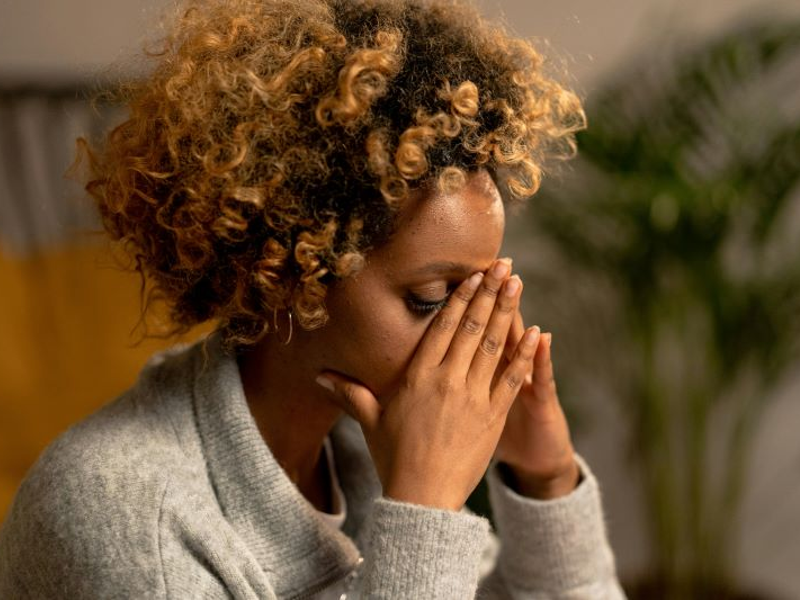Photo by cottonbro studio
According to the World Health Organization (WHO), one in four people will struggle with a mental illness at some point during their lives.
Mental health, a critical aspect of overall well-being, affects people across all racial and ethnic backgrounds. However, communities of color may be at higher risk of poor mental health due to several challenges. Experiencing microaggression, racism, discrimination, and inequity may impact the psychological well-being of an individual and also increase one’s risk of mental illness. This has remained a challenging topic in the Black community since most people are not open to discussing their mental health due to shame. One may ask, why is the Black community not taking mental health seriously?
There has been a lack of understanding about mental health in the Black community. More so, research has found that there is a high degree of stigma associated with it.
According to the National Alliance on Mental Illness (NAMI), “A study showed that 63% of Black people believe that a mental health condition is a sign of personal weakness. As a result, people may experience shame about having a mental illness and worry that they may be discriminated against due to their condition.”
The stigma associated with mental health is peculiar to the Black community for different reasons.
Mental health is seen as a sign of weakness: Blacks have this survivalist mentality, probably born from systemic oppression and racism. People fear admitting to facing mental health challenges so as not to be seen as lacking that resilient spirit. After all, we survived slavery; so what is a little “sadness” or “anxiety” that we cannot overcome? The problem with this mentality is that we fail to recognize that mental illness is much more than feeling melancholy or anxiety.
Mental illness is seen as a spiritual problem to be addressed through faith: Blacks are among the most religious of any racial or ethnic group in the United States. Rather than seek professional help when facing mental challenges, some would rather run to their religious community, depending on prayer and faith to heal them.
A doctor shared the story of a lady with complaints of being suspicious of everyone around her including her family members as well as hearing voices of unseen people in clear consciousness. After visiting several religious homes for prayers and deliverance with no improvement, she was later brought into the mental health home. Despite counseling and education about mental health, her father disowned her, saying no one in his history as such, it was a stain on his family name, and that he could not associate himself with her further.
This is one of several stigma patients with mental illness face, especially in developing countries.
The Impact Of Mental Health Stigma On Individuals, Families, And The Broader Community
The pressure of mental health stigma can come from family, friends, coworkers, and society on a broader level, and this has far-reaching effects on individuals, families, and communities. According to the Mental Health Foundation, nearly 9 out of 10 people with a mental illness feel stigma and discrimination negatively impact their lives.
Impact on individuals:
Social exclusion: The stigma can affect an individual’s state of mind, causing them to refrain from participating in activities in their community or family. They may also lose their self-esteem and withdraw from people.
Conceal their condition and do not seek help: The stigma contributes to a reluctance to recognize the need for the help of a physician or therapist. Some people do not seek help for fear of judgment or discrimination, thereby delaying their treatment and worsening their case.
Impact on families:
Social exclusion: Because of the shame, some families may not want to socialize with other community members. This social exclusion can hinder the creation of support networks and understanding.
Dysfunctional family: The stigma may cause a rift in the family as they may resort to the blame game. Some may blame family members for an individual’s illness, causing patients to experience further feelings of shame and guilt.
The burden of secrecy: Families may feel compelled to keep mental health challenges a secret, leading to increased stress and difficulty in seeking support.
Stress and burnout: While trying to keep it a secret, family members serving as caregivers may experience increased stress and burnout.
On community:
More people with mental illness who do not seek help: The more people who keep their mental health challenges a secret, the more people without help, which can cause more problems in society.
Reduced community support: Community members may be discouraged from supporting mental health initiatives because of the stigma, hindering the creation of a supportive environment.

Photo by cottonbro studio
Barriers To Mental Health Care In Black Communities
Black individuals are more likely to experience mental health problems but are less likely to seek treatment for a variety of reasons.
Accessibility and Availability: Despite the needs, only one in three Black adults who need mental health care receive it. Also, there is limited access to mental health services, especially in rural areas or low-income neighborhoods, which can be a significant barrier.
Affordability, poor health insurance: A number of African Americans have no form of health insurance or financial resources. This may impede access to mental health care services.
Stigma, negative stereotype: Many people fear being labeled “crazy” for simply seeking support from a therapist. They would rather keep their mental health challenges to themselves than seek professional help.
Mistrust of the healthcare system: There is a general distrust of the medical establishment and this is not without merit. Historically, African Americans have been misdiagnosed at higher rates than White patients. This has impacted the willingness of Blacks to seek help or stay in treatment.
Lack of culturally competent providers: Black patients may prefer seeing Black therapists, but there are only a few Black mental health professionals. Individuals are less likely to seek help if they feel the professional would be unable to relate to their experience or understand their point of view. Also, there may be a lack of understanding due to cultural differences between clients and mental health providers, hindering effective communication.
Cultural and spiritual belief: Praying and having faith is not a bad thing, as it can be a source of strength. The only problem is overreliance on these. Some people would rather spend all their nights and days in religious houses, hoping for a miracle, rather than seek professional mental health support.
What Are Some Of The Solutions?
- Improvement of treatment rates among minority populations.
- Addressing financial barriers.
- Creating more awareness and understanding of mental health issues.
- Establishing more support programs where individuals with experiences can share their stories, providing relatable role models.
- Ensure diversity in the hiring process by including more professionals from Black communities.





